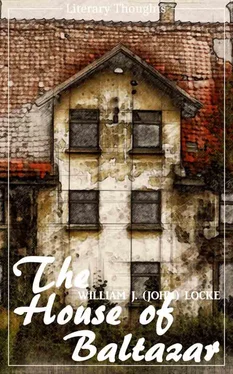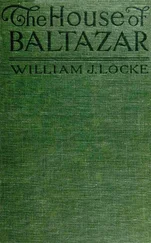At the butcher’s door, freshly coloured as the carcasses hanging at each side, stood Gwinnie Bates, the leader of the staring crowd, blocking the way. Quong Ho, trained theoretically by Baltazar in European ceremonial, swept her a bow with his billycock hat—a bow composite of the court of Charles the Second and Ratcliffe Highway, and addressed her:
“Beauteous Madam, will you allow your devoted servant the privilege of a passage?”
She melted hysterically from the doorway. Her friends, like a grinning Red Sea, divided into an avenue through which passed Quong Ho, with gestures courteously expressive of thanks, followed by the butcher’s assistant carrying to the cart the leg of mutton and the joint of beef which Quong Ho had purchased. Quong Ho drove off amid unceremonial guffaws and gigglings.
“Beauteous Madam! Oh, Hell!” roared the butcher’s assistant.
Gwinnie Bates checked her mirth and advanced with flushed cheeks and defiant eyes.
“What’s wrong about it, Johnnie Evans? If you want to insult me, say it out. If you can’t be a gentleman, at least be a man.”
“Pretty fine gentleman,” sneered Johnnie Evans, jerking a thumb towards the receding Chinaman.
“He can teach manners to the likes of you, at any rate,” cried Gwinnie Bates, and went off triumphant with her head in the air.
Thus, through the courteous demeanour of Quong Ho on this and subsequent occasions, Water-End became divided into two camps—Sinophile and Sinophobe. The latter party asserted that such heathen smiled most when their designs were most criminal, and carried out their activities to the accompaniment of unholy mirth. Was he ever seen at church or chapel? His admirers confessed this abstention from the means of grace. Did he ever speak of the doings of his master with the outlandish name, and himself, in the middle of the moor? Quong Ho was admitted to be a museum-piece of discretion. And as time went on, although his ways were marked by the same perfect courtesy, he lost favour amongst his party, through a bland taciturnity and a polite rejection of conversational advantage.
Now for this taciturnity there were excellent reasons: none other than the commands of John Baltazar. When Quong Ho returned the first time to the farm with the jeering laughter ringing in his ears, he bewailed the impoliteness of the inhabitants of Water-End. Said Baltazar in Chinese:
“Dost thou not know the proverb, Quong Ho, ‘A man must insult himself before others will?’ And again, what saith the Master? ‘Rotten wood cannot be carved, and walls made of dirt and mud cannot be plastered.’ By acting against my orders and striving to plaster the muddy walls of these rustics with ceremonial politeness, you have insulted yourself and therefore exposed yourself to rudeness.”
“Master,” said Quong Ho, “it appears that I have erred grievously.”
“Listen again,” said Baltazar, with a twinkle in his eyes unperceived by the downcast Quong Ho, “to what the Master saith: ‘The failure to cultivate virtue, the failure to examine and analyse what I have learnt, the inability to move towards righteousness after being shown the way, the inability to correct my faults—these are the causes of my grief.’ ”
Quong Ho replied that although his deviation from the path of virtue was glaring to the most myopic vision, he nevertheless was in a dilemma, inasmuch as he had followed the precepts of Western courteous observance, the ceremonial, for instance, of the hat-salutation, laid down for him by his illustrious teacher.
Baltazar, always in Chinese, replied kindly: “O youth of indifferent understanding, is it not written in the Shû King in the Charge to Yüeh: ‘In learning there should be a humble mind and the maintenance of a constant earnestness: in such a case improvement will surely come. When a man’s thoughts from first to last are constantly fixed on learning, his virtuous cultivation comes unperceived’?”
“With those truths am I acquainted,” replied Quong Ho.
“Then, my good fellow,” retorted Baltazar in English, “why the devil don’t you apply them? I’ve absolutely forbidden you to have any intercourse whatever with the people round about. You’re not to talk to them about my concerns or your concerns. You’re not to listen to any of their talk or to bring back to me scraps of their rotten gossip. You’re to go to Water-End on necessary business—unfortunately we can’t live on air or warm ourselves in the winter with bottled sunbeams—but that’s the limit. Outside of that you’re a man deaf and dumb. You’re to go one better than the three Sacred Apes of Japan, who, holding hands respectively before eyes, ears and mouth, signify ‘I see no evil; I hear no evil; and I speak no evil.’ In your case, it’s to be: ‘I see nothing; I hear nothing; I speak nothing.’ ”
“In future,” said Quong Ho, “my eyes shall be blinded, my ears sealed and my mouth locked.”
“If there are any more animated discussions of last week’s thunderstorms, or further Beauteous-Madamizing of young females, I’ll regretfully have to send you straight back to China.”
The unblinking stare in Baltazar’s great grey eyes and the obstinate set of his lips—signs of purpose which Quong Ho for eight years had learned to gauge with infallible precision—caused him to quake excessively. Not only was his servitude to Baltazar a matter of oath, but a return before the completion of the special education which would enable him to take immediate rank in New China, would be the death-blow to his ambitions. So Quong Ho took to heart the precepts of the Humble Mind and swore to outdo the Sacred Apes of Japan, even as his master had ordained.
After this, in the first days of their Thebaïd, master and man held frequent conversations on the relations with the outside world which the former had prescribed. The three years, said Baltazar, which lay before them in the solitude of the wilderness, were for the maceration of the flesh, the pursuit of virtue and the cultivation of the intellect. He illustrated his argument with countless quotations from the Chinese classics.
“In this fashion, Quong Ho,” said he, “you are drinking of the Five Sources of Happiness. To wit: Long Life: for here, in this unpolluted atmosphere, you are acquiring physical health. Riches: they will be yours in no matter what University of Modern China you go as Professor of Mathematics. Soundness of Body and Serenity of Mind: the Latins put the idea into epigrammatic form—Mens sano in corpore sano; what can be more conducive to serenity of mind than this studious solitude, undisturbed by material cares? The Love of Virtue: we have every hour of all our days to acquire it. Fulfilling to the end the WILL; is it not the WILL that has set us here?”
“Indubitably,” said Quong Ho.
“Hearken again,” said Baltazar, “to the Six Extreme Evils. Misfortune shortening the Life: from that no man is exempt—but from it no men are more than we protected. Sickness: likewise—but I have a box of simple remedies, and if the worst comes, there is a man learned in physic at Water-End. Distress of Mind: if our minds in these ideal surroundings are so unstable as to be distressed, we are unworthy of the name of philosophers. Poverty: I have an ample fortune. Wickedness: we, who are Seekers after Truth, have deliberately set ourselves beyond the reach of Temptation. Weakness: that, O Quong Ho, is the only danger. You must be on your guard against it night and day, especially on the days when necessity exposes you to the manifold temptations of that microcosm of Babylon, Pekin and San Francisco which goes by the name of Water-End.”
So it came to pass that when astounding tidings, the most pregnant in the world’s history, came to Water-End and the little townlet blazed with the wildfire of gossip, Quong Ho, scrupulous obeyer of Law, heard without listening and, forbearing to question, always returned to Spendale Farm with a mind rendered, with Oriental deliberation, so profoundly blank as to preclude the possibility of retailing to his master the idle news of the outer world. And gradually, such is the contempt bred by familiarity, Quong Ho lost prestige in Water-End. His weekly appearance in the town, with old grey mare and cart, grew to be one of the commonplace recurrent phenomena such as the Vicar’s Sunday sermon and the Saturday evening orgy and home-convoying of old Jack Bonnithorne, the champion alcoholist of the moorland.
Читать дальше












